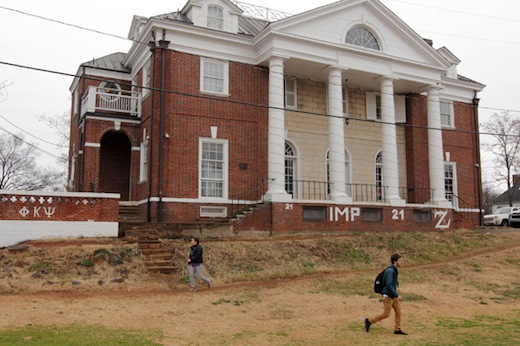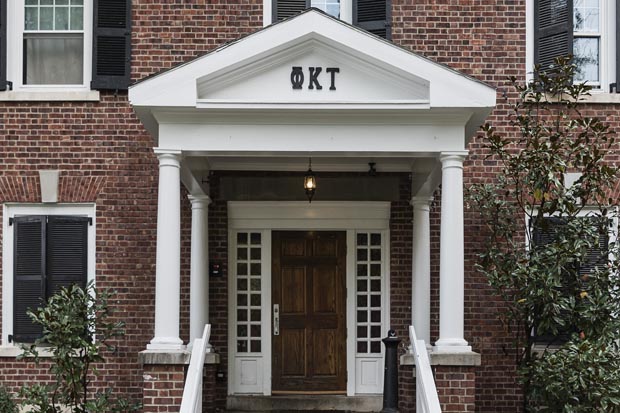New York
It’s a new semester and a new start at the University of Virginia. Thomas Jefferson, the university’s founder, once encouraged America’s youth to ‘come and drink of the cup of knowledge and fraternise with us’. But this term, any student who fancies a swig from the cup of knowledge had better be sure it doesn’t contain any unauthorised alcohol — in fact he should beware fraternising at all, especially in a ‘frat house’, for fear of breaking the strict new rules.
It’ll seem incredible to fans of the 1978 film Animal House, but at the University of Virginia, one of the heartlands of America’s famous ‘Greek’ system, the chilly hand of authority has clamped down on frat-house life. All those single-sex student houses with names like Alpha Tau and Chi Phi, once the scene of capers involving beer, shaving foam, puking and cheerleaders, have been asked to sign a contract which for them amounts to a death warrant.
New rules ban beer kegs and pre-mixed drinks from parties. The drinks must only be poured by three uninebriated undergrads acting as ‘sober monitors’. These monitors must have keys to every room and are under orders to stop anyone going upstairs to bedrooms. Such venerable frat traditions as ‘beer pong’ (a drinking game: look it up) or the more esoteric wheeze of pumping red wine up your rectum are probably out of the question now. You can see why the frat boys are peeved — a frat house that cannot throw a debauched party is like a bird that cannot fly.
The University of Virginia’s stated reason for disciplining ‘Greek’ students appeared in Rolling Stone in November. The magazine published a shocking 9,000-word exposé of an appalling incident at one of the university’s frat houses, Phi Kappa Psi. A female first-year student, identified only as Jackie, recounted to the article’s author a tale of having been gang-raped by seven men during a party two years earlier. After being lured into a pitch-dark room, she said, she faced a three-hour ordeal which appeared to be some sort of initiation rite. (Her attackers referred to her as ‘it’.) Why the two-year wait to tell her story? Because, she said, when she told her friends at the time, they asked her not to rock the boat — they wanted to get into Phi Kappa Psi themselves.

When it came out, the Rolling Stone story caused a to-do across America. The Phi Kappa Psi fraternity house was attacked by a mob and had its windows smashed. But the tale had one weakness — it may not have been true. Anxious to tell this harrowing story, the article’s writer hadn’t talked to many of the central characters, including the accused (who weren’t named but could have been identified). When other reporters investigated, the local police said there was no indication that Jackie had been raped at the frat house, although it is possible she was attacked somewhere else. Rolling Stone grovelled and anti-rape campaigning groups, who’d made great hay with the story, were furious, claiming their cause had been set back decades.
So why is the University of Virginia still squeezing the Greeks? Why aren’t the frat boys and girls free once more, out from the cloud of opprobrium, gambolling happily in pools of beer and vomit?
Well, what was most telling about the Rolling Stone story was just how ready people were to believe it. American campuses have become more puritanical in recent years, and with this new sober mindset has come a feeling that the Greek system is an anomaly. Several universities have banned the fraternities and sororities altogether, with others demanding that they sign pledges similar to the one at Virginia.
Stories are told of inter-frat violence, sexual assaults and underage drinking on an industrial scale. Lawsuits — along with the damaging headlines — are stacking up. Since 2005 more than 60 people have died in fraternity-related incidents. Many more have been badly injured, raped or traumatised. A fair few frat members are seriously hurt in initiation rituals. Most of them, rather worryingly, seem to be fixated on the initiate’s buttocks. Several ‘pledges’, as aspiring members are called, have been beaten to death in hazings. The most recent death, last year, involved a young student who was left blindfolded, possibly barefoot, with no phone and little water in a remote area of a California national forest. He died from heatstroke during the 18-mile hike to civilisation.
But hazing accounts for a small minority of accidents. Many of the victims are outsiders who just end up coming to harm in the anything-goes frat party environment. A common tragedy is people falling out of the windows of ‘sleeping porches’, an upper floor communal dormitory in most frat houses filled with three-tier bunk beds. For some no doubt character-building reason, windows are always left open even in freezing temperatures. During an amorous tryst at a University of Idaho frat house, a girl rolled off the top bunk and straight out of a second-floor window. The 25ft fall on to concrete left her brain-damaged and needing a wheelchair.
Perhaps it’s understandable, then, that the university chose to crack on with its crackdown, despite the inconsistencies in the Rolling Stone story. But on the other hand, there is a positive side to Greek life. Frats aren’t merely an attempt to mimic the high-living antics of snotty British student drinking clubs such as the Bullingdon. The first proper frat formed in 1825 in an obscure upstate New York college as a reaction to the university system’s puritan work ethic. Partly based on the Freemasons, the Kappa Alpha Society had its own secret rituals as well as an interest in literature and Ancient Greek culture. The idea rapidly caught on around America. They got their priorities sorted quickly, it seems: ‘I got one of the nicest pieces of ass some day or two ago,’ a Sigma Phi member wrote to one of his frat brothers in 1857.
Today, most Supreme Court judges and Fortune 500 company bosses are former frat members, as are many US presidents, senators and athletes. Frat supporters say they foster leadership and public service, as well as raising millions of dollars for charity and providing many hours of community service. Quite apart from that, Greek alumni tend to be generous donors to their universities. Cynics say America’s multi-billion-dollar higher education industry, which charges huge sums for places, needs to make college years sound fun if it’s to keep attracting students.
So the Greeks push on, swimming against the tide, and if the zeitgeist is against them now, at least the new student intake isn’t. Every year for the past decade, the number of frat members has increased 4 per cent, and even after all the fuss at Virginia and the Rolling Stone story, this year the number of women choosing to ‘rush’ sororities on campus is at a record high.
Got something to add? Join the discussion and comment below.
Get 10 issues for just $10
Subscribe to The Spectator Australia today for the next 10 magazine issues, plus full online access, for just $10.
Tom Leonard is the Daily Mail’s correspondent in New York.
You might disagree with half of it, but you’ll enjoy reading all of it. Try your first month for free, then just $2 a week for the remainder of your first year.














Comments
Don't miss out
Join the conversation with other Spectator Australia readers. Subscribe to leave a comment.
SUBSCRIBEAlready a subscriber? Log in